VOTER GUIDE
 On Tuesday, June 30, Faith in Public Life and Interfaith Power & Light released a voter reflection guide endorsed by prominent national faith groups and religious leaders. The guide, Democracy, Values & the 2020 Election, addresses urgent issues in the election, including voting rights, climate change, systemic racism in the criminal justice system, healthcare and immigration. The guide, which will be distributed across the country for discussion in diverse faith communities, includes topics for reflection and sample questions to ask candidates Download Full Guide Here
On Tuesday, June 30, Faith in Public Life and Interfaith Power & Light released a voter reflection guide endorsed by prominent national faith groups and religious leaders. The guide, Democracy, Values & the 2020 Election, addresses urgent issues in the election, including voting rights, climate change, systemic racism in the criminal justice system, healthcare and immigration. The guide, which will be distributed across the country for discussion in diverse faith communities, includes topics for reflection and sample questions to ask candidates Download Full Guide Here
Download Spanish-language version of the guide, Democracia, Valores y las Elecciones de 2020
Issues and Questions
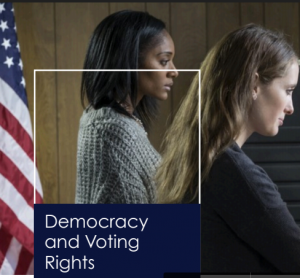 Democracy and Voting Rights (Page 1)
Democracy and Voting Rights (Page 1)
This election is more than a choice between parties and ideologies. An even more fundamental question is at stake: Can we preserve democracy in the face of serious threats to fair elections and fundamental rights?
Questions for Reflection and Candidates
- How do you see democratic values at risk today?
- How do systemic barriers to voting undermine our most sacred democratic values?
- How can your faith community better advocate for stronger voter protections at the state and local level?
- As a candidate, what are your specific plans for protecting and strengthening voting rights?
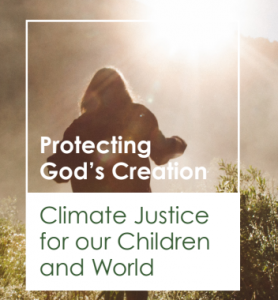 Protecting God’s Creation Climate Justice for our Children and World (Page 2)
Protecting God’s Creation Climate Justice for our Children and World (Page 2)
As people of faith, we believe that responding to the urgent threat of climate change is essential to caring for God’s creation and loving our neighbors. Human activity, primarily the burning of fossil fuels for energy, has thrown
nature out of balance, polluted the air, driven thousands of species of God’s creatures to extinction, intensified catastrophic events such as wildfires and hurricanes, and threatened the lives and livelihoods of our most vulnerable brothers, sisters and neighbors around the world. Scientists tell us we have less than a decade to avoid even more catastrophic consequences.
The United States has a unique responsibility to show moral and political leadership:
- Transitioning our economy away from polluting fossil fuels toward 100% clean energy.
- Honoring the emissions-reduction commitments our nation made at the UN Conference on Climate Change in Paris in 2015, and taking additional actions needed to avert catastrophic global warming.
- Assisting developing nations— who are least responsible for climate change but most impacted by it — in coping with threats such as increased droughts, disease, and sea-level rise by sharing technology and financial support.
Questions for Reflection and Candidates
- What does your faith teach about our responsibilities for the Earth and to others? How are they interdependent?
- Has your faith community made an effort to cut emissions, save energy, or practice environmental stewardship?
- As a candidate, what specific policies do you support to protect God’s Creation and secure a safe climate for our children and future generations?
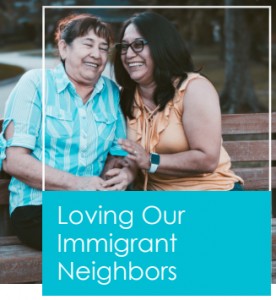 Loving Our Immigrant Neighbors (Page 4)
Loving Our Immigrant Neighbors (Page 4)
Scripture repeatedly makes clear that immigrants must be treated with dignity. Policies that rip children from their parents’ arms, lock people away in inhumane conditions, and ban desperate families from entering the country
should keep us awake at night. As people of faith, we believe that the way we treat our immigrant neighbors is a sign of how we treat God.
Questions for Reflection and Candidates
- How can we replace immoral immigration policies that tear families apart and cause trauma with an immigration system that values families and affirms the dignity of allv people?
- What can we do to heal the wounds inflicted on immigrant communities by political rhetoric that portrays them as a dangerous “other?”
- If there are immigrants in our community who are feeling isolated and under threat, how can we show support and build connections?
- As a candidate, what will you do to defend the dignity of all immigrants, and how will you further policies that keep families together?
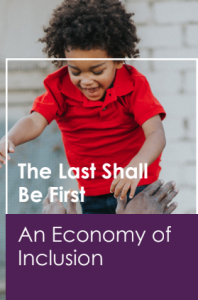 The Last Shall Be First An Economy of Inclusion (Page 5)
The Last Shall Be First An Economy of Inclusion (Page 5)
Our economic systems should work for all Americans, not only the wealthiest few. This is a matter of justice and
human dignity. All religious traditions recognize that charity is essential to care for the most vulnerable, but helping our neighbors in poverty also compels us to address its root causes. “Charity is no substitute for justice withheld,” St. Augustine observed centuries ago.
Questions for Reflection and Candidates
- What can we do to ensure that all Americans are able to provide for their families and live with security and dignity?
- How do we create a just tax system that is fair to all Americans, including working families who are trapped in poverty?
- Why does the United States lag behind most developed countries when it comes to providing paid sick leave and paid family leave?
- As a candidate, what are your specific plans to ensure workers have living wages and economic security while the coronavirus pandemic continues, as well as for the long term?
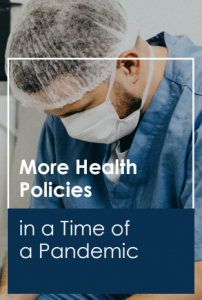 More Health Policies in a Time of a Pandemic (Page 7)
More Health Policies in a Time of a Pandemic (Page 7)
Despite our nation’s stated values of life and equality, the United States is the only industrialized country in the world that does not guarantee its residents universal access to health care. This is a failure of political and moral imagination – especially in a time of pandemic.
Questions for Reflection and Candidates
- How can people of faith be most effective in using our stories, congregations and power to advocate for health care reform?
- What do you struggle with the most when it comes to our healthcare system?
- How has the COVID-19 crisis impacted your community? What policy solutions can keep us all safe and remedy racial and economic inequalities in your community?
- As a candidate, what are your specific plans for making sure that quality,
affordable health care is available for all?
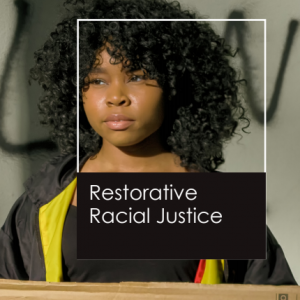 Restorative Racial Justice (Page 9)
Restorative Racial Justice (Page 9)
Justice and redemption are at the very heart of faith. Restorative justice begins with listening to and empowering communities that have been exploited, excluded and denied equal representation and freedom. The evil ideology of
white supremacy shaped our nation from its founding and continues to impact policies and communities today, especially in the criminal justice system. The killings of Ahmaud Arbery, Breonna Taylor, George Floyd and so many other Black people, Indigenous people, and other people of color, has provoked a growing, multi-racial moral movement for accountability and systemic reforms for racial justice.
Questions for Reflection and Candidates
- How can we dismantle the evil ideology of white supremacy in our culture and political systems?
- What can be done to end racial profiling and police violence against people of color?
- What steps can be taken to ensure formerly incarcerated people have voting rights and fair access to employment?
- As a candidate, what will you do to ensure racial justice is prioritized in the criminal justice system?
- How do we build safe communities for everyone, particularly people of color?
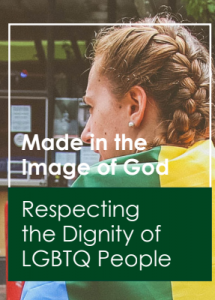 Made in the Image of God: Respecting the Dignity of LGBTQ People (Page 11)
Made in the Image of God: Respecting the Dignity of LGBTQ People (Page 11)
All people have inherent dignity because everyone is created in the image of God. Our gay, lesbian, bisexual and transgender family members, neighbors and co-workers deserve equal rights, and to live without fear or discrimination.
Questions for Reflection and Candidates
- How can your faith community more fully support the equal dignity of LGBTQ people in your state and local area?
- What are the greatest threats to LGBTQ people in your community and the nation?
- As a candidate, what are your specific plans to ensure that LGBTQ people have equal rights and are treated with dignity
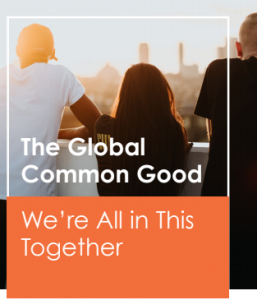 The Global Common Good: We’re All in This Together (Page 12)
The Global Common Good: We’re All in This Together (Page 12)
What does it mean to love our neighbors as ourselves in a globalized world? The health and future of our country and
communities are interconnected to the health and security of other nations. Our fates are bound up in what Rev. Martin Luther King, Jr., called “an inescapable network of mutuality.”
Questions for Reflection and Candidates
- What policies do you think are most important for creating security for your family and community?
- What role should the United States play in the world to help build global peace and security?
- How can your faith community advocate for policies to create a more peaceful world?
- As a candidate, what programs and policies would you prioritize to help build secure communities and a peaceful world?

Methane Comments: Odile Coirier
/in Earth & Faith, Faithful Citizenship, Featured Articles, NEWS, Permian Basin /by admin(The EPA is hosting three virtual public hearings on January 10-12. These hearings are an important opportunity for communities across the country to make their voices heard, and demand that EPA adopts strong, comprehensive methane safeguards to protect our health and our planet. We share ccomments from New Mexico and El Paso residents).
Hello, my name is Odile Coirier, I am a Catholic Sister, working with Interfaith Power and Light New Mexico-El Paso Region. I live in El Paso Texas. I appreciate this opportunity to share why strong federal methane rules are important to me and my community. I thank you for your work on the methane supplemental rule proposal that will help protect our environment and our communities.
In El Paso, we have great concern about the quality of life and health of our communities. We are in the Permian Basin and in Texas where oil and gas production are prominent. I went several times in the Permian, the story of the people is alarming, disturbing, sad. The destruction of the environment is disturbing as well!
Our area has several wells. EPA has the power to ensure that the oil and gas production facilities will operate in a safer way. Methane pollution brings with it well documented health problems especially for our low-income communities.
We know that Texas doesn’t have strong methane rules. We need you!
This Methane supplemental rule proposal is an important step forward. and specially to ensure that approved monitoring technologies and data are available to all so that communities and individuals can participate and engage in the Super Emitter Response Program, which is designed to quickly address very large leaks from the oil and gas industry.\
I am counting on this Administration and your agency to quickly address these concerns, and to finalize strong, comprehensive Methane rules.
Thank you for the opportunity to share my comments. Thanks for your commitment for social justice at the service of our communities.
Methane Comments: David Robertson
/in Earth & Faith, Faithful Citizenship, Featured Articles, NEWS, Permian Basin /by admin(The EPA is hosting three virtual public hearings on January 10-12. These hearings are an important opportunity for communities across the country to make their voices heard, and demand that EPA adopts strong, comprehensive methane safeguards to protect our health and our planet. We share ccomments from New Mexico and El Paso residents).
My name is David Robertson. I live in Albuquerque, New Mexico. I am a retired professional engineer. I spent 35 years working on energy efficiency as a research engineer and a facilities engineer.
Th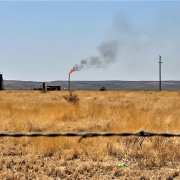 ere are many reasons to implement strong federal methane safeguards. I have personal reasons that we need these safeguards. I am concerned for myself, my friends, my family, and future generations as we suffer the effects of oil and gas production and climate change. My son and his family – which includes 3 young children – live in West Texas in the Permian basin – a large oil and natural gas producing area. The region has produced large quantities of methane and VOCs over the years, which contribute to climate change and poor air quality. I am concerned for the health of my son and his family. Families living close to oil and gas who suffer from terrible health conditions. They experience, first hand, growing concerns of health, quality of life, environmental pollution and deterioration of air quality. I have friends in California who just this week had to evacuate to escape flooding and mudslides. I have family and friends on the East Coast who are impacted by sea level rise. We in the Southwest United States are experiencing extreme drought. Immigrants are at our borders escaping the effects of climate change. The damage from climate change to life on the planet is all around us.
ere are many reasons to implement strong federal methane safeguards. I have personal reasons that we need these safeguards. I am concerned for myself, my friends, my family, and future generations as we suffer the effects of oil and gas production and climate change. My son and his family – which includes 3 young children – live in West Texas in the Permian basin – a large oil and natural gas producing area. The region has produced large quantities of methane and VOCs over the years, which contribute to climate change and poor air quality. I am concerned for the health of my son and his family. Families living close to oil and gas who suffer from terrible health conditions. They experience, first hand, growing concerns of health, quality of life, environmental pollution and deterioration of air quality. I have friends in California who just this week had to evacuate to escape flooding and mudslides. I have family and friends on the East Coast who are impacted by sea level rise. We in the Southwest United States are experiencing extreme drought. Immigrants are at our borders escaping the effects of climate change. The damage from climate change to life on the planet is all around us.
I am a member of the First Unitarian Church of Albuquerque and New Mexico Interfaith Power and light. The people of faith of New Mexico Interfaith Power and Light have worked with the EPA on creating strong methane rules since the beginning of this process. We are working hard for the Common Good. We count on the EPA to work in good faith with us. We need to act quickly for strong rules. This ethical and moral work is not optional, it is the demand of loving service.
I am a strong advocate for care of creation and protection of this wonderful world we have been blessed with. The mission of the Environmental Protection Agency is to protect the environment. That includes plants, animals, and people. It is life on this planet that I am most concerned about. We have a spiritual, ethical and moral duty to love and care for our neighbor and creation.
Oil and gas companies are wasting about $2 billion a year worth of natural gas through venting, flaring, and leaks. At a time when Americans are struggling to pay home heating bills, it is unconscionable that oil companies are literally burning natural gas into the air – a practice that is wasteful and harmful to health.
Commonsense fixes to reduce methane emissions can be done for little cost. Oil and gas companies seeing record profits could deploy these fixes to reduce methane emissions for pennies on the dollar.
Corporate greed is driving energy prices.
While American families struggle at the pump and communities suffer from the impacts of climate change, Big Oil CEOs are raking in record profits – more than $210 billion in the first six months of 2022. Instead of reducing prices, Big Oil is lining their pockets.
Through methane protections we can create good-paying jobs, lower families’ energy costs, and reduce pollution. Reducing methane emissions is the fastest, easiest and cheapest thing we can do to immediately slow the pace of climate change. Methane pollution has more than 80 times the warming power of carbon dioxide over its first 20 years in the atmosphere. Cutting methane pollution from the oil and gas industry is the quickest, most cost-effective way to slow the rate of climate change and protect communities across the country.
Every day that passes without strong federal methane safeguards in place is a missed opportunity to reduce climate and air pollution from the oil and gas industry, protect the health and wellbeing of communities across this country, and put hundreds of thousands of Americans to work building a more efficient and secure energy system. We cannot continue to wait.
We must act now to stop the worst harm. It is urgent that we implement, strengthen, and finalize these rules and make sure there is industry oversight once they are in place.
I urge you to take all possible measures to put in place strong federal safeguards to reduce methane emissions.
Thank you for the opportunity to make a public comment on this issue.
Methane Comments: Arcelia Isais-Gastelum
/in Earth & Faith, Faithful Citizenship, Featured Articles, NEWS, Permian Basin /by admin(The EPA is hosting three virtual public hearings on January 10-12. These hearings are an important opportunity for communities across the country to make their voices heard, and demand that EPA adopts strong, comprehensive methane safeguards to protect our health and our planet. We share ccomments from New Mexico and El Paso residents).
Throughout my relatively short educational and professional career, I have dedicated my life toward moving us toward a sustainable future. In these ten years, I have operated under the faith and determination that as the technology gets better and the science becomes clearer, we would collectively move toward this path naturally. What instead I’ve seen over and over again is a resistance towards doing even the bare minimum.
New Mexico has some of the worst methane pollution in the country. In addition to causing a quarter of the global warming we are experiencing, methane operations also release compounds into our air that cause respiratory diseases and increase risks of cancer.
Stopping pollution is a crucial first step we must take for protecting our communities. From a moral, physical, and spiritual standpoint, we can no longer afford to keep sacrificing the health of our people for short term economic gain.
This country has repeatedly empowered industries who routinely put our children at risk. It’s become so normalized and expected, there’s now an entire generation of kids who, like me, are growing up and realizing they are beholden to a system that agreed to put their future at stake so previous generations could turn a profit.
It is for these reasons that I strongly support doing the bare minimum of strengthening our federal methane regulations. I say this is the bare minimum because we are not asking to shut down all operations nor to ban all toxic emissions, but simply to regularly inspect these operations and lower the emissions to safer levels.
Thank you again for your time.